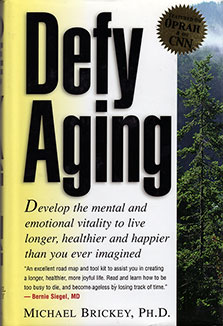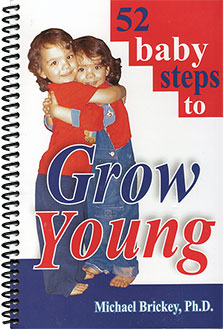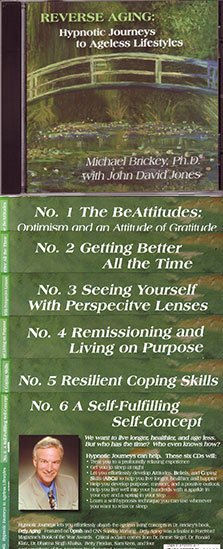The Defy Aging Newsletter
Anti-aging psychology, holistic health, and wellness
These are archives of a biweekly e-mail newsletter for helping you think, feel, look, and be more youthful and live with purpose.
July 2, 2009 Number 211
This issue:
Stress Illness: When Doctors "Can't Find Anything Wrong"
Action to take
Take a stress inventory in which you list everything that causes you fear, worry, anxiety, tension, anger or emotional pain. Often we aren't consciously aware of some major stresses. Keep list with you for a week or more and add to it as you become aware of other stresses. Then rank order them and determine what you can do, be it big or small, to help attenuate some of the top two or three stressors.
Why
Every year millions of people go to their doctors with very real illness, see several specialists, go through endless tests only to be told, “We can’t find anything wrong with you.” Often the problem is caused by a illnesses largely ignored by medical schools stress illnesses. I recently interviewed Dr. David Clarke, author of They Can’t Find Anything Wrong: 7 Keys to Understanding, Treating, and Healing Stress Illness,about howhow to recognize stress illnesses and what to do about them.
The problem isn’t that therapists don’t know how to deal with childhood issues, stress, PTSD, depression, and anxiety. The problem is that patients with stress illnesses go to their physicians or emergency rooms with real illnesses. The physicians focus on physical causes and have little training in psychological causes. When the tests find nothing, most just keep looking or refer to a specialist. Few of these patients would go directly to a psychologist but even if they did, many psychologists, since they haven’t had training in dealing with patients who present with ostensibly physical illnesses, would be distracted by or intimidated by the physical illnesses.
Thus, the patients go on a wild goose chase and the problems persist for years—possibly even a lifetime. I would try to come up with a statistic like half of all doctor visits are stress related, but that is an artificial statistic as stress and physical causes are usually co-conspirators in illnesses. The good news is that most psychologists and mental health professionals are very familiar with how to treat stress illnesses, including those arising from abusive childhoods or trauma.
Dr. Clarke’s book, They Can't Find Anything Wrong!, and the training he is doing is sorely needed. It would help if doctors put some stress related questions on their screening histories. Medicine is very protocol driven. If medical decision trees say refer to a psychologist or other qualified mental health professional when the usual tests for the presenting problem aren’t finding anything wrong, many of these patients would get the help they need.
The ultimate solution would be to have a psychologist in every primary care physician’s office and many specialist’s offices as well. The doctor could walk over and introduce the patient to the psychologist or mental health professional and make an appointment. That can be especially important to grease the path since many of these patients are probably reluctant to see their illness as having a psychological cause. I note the American Psychological Association is increasingly advocating for psychologists to be in primary care physician’s offices. The Ageless Lifestyles® LLC show with cardiologist Dr. Joel Okner and cardiopsychologist Dr. Jeremy Clorfene provides an excellent illustration of how this can work in a specialty practice as well.
When children grow up in dysfunctional families, they often make decisions at a very young age about what script to follow. Some act out. Some develop abysmal self-esteem and become physical or emotional punching bags. Some turn to alcohol or drugs. Some become junior social workers trying to please everyone and avoid conflict or strife. Some have to sacrifice their childhoods and parent parents or sibs. Many try to cope by being perfect. Thus, many patients whose stress illness had childhood origins seem so responsible and effective that few suspect anything is wrong psychologically.
To recap the solution Dr. Clarke recommends, the first two steps are diagnostic—first, consider stress as a possible cause and second, search for sources and connections. Creating a stress inventory and periodically adding to the list can help. Then it is on to seeking whatever solution or therapy will be more helpful. Some of the strategies Dr. Clarke especially likes include giving yourself permission to play, scheduling time for yourself, writing letters, observing children and imagining them experiencing the stresses, time-limited support groups, and becoming the person you always wanted to be. I especially like the becoming the person you always wanted to be. It implies thegoal isn't just the absence of headaches, backaches, and stomach aches, but also having a wonderful life.
You can hear the free 50 minute podcast of my interview with Dr. Clarke at Ageless Lifestyles® LLC.
Quotes
Because the same symptoms can also result from diseases that can be diagnosed through tests visible illnesses it is that much more baffling when the causes can’t be identified.
~Dr. David Clarke
Humor
I read this article. It said the typical symptoms of stress are eating too much, smoking too much, impulse buying, and driving too fast. Are they kidding? That is my idea of a great day!
~Monica Piper
Reprint this article from:
THE DEFY AGING NEWSLETTER
Anti-Aging Psychology
Holistic Health and Wellness
This newsletter article may be reprinted in E-zines, newsletters, newspapers, and magazines provided the content is not edited and the attribution below is given. Formatting may be changed and you may use one of the web site pictures of the author to accompany the article.
"Dr. Michael Brickey, The Anti-Aging Psychologist, teaches people to think, feel, look and be more youthful. He is an inspiring keynote speaker and Oprah-featured author. His works include: Defy Aging, 52 baby steps to Grow Young, and Reverse Aging (anti-aging hypnosis CDs). Visit www.NotAging.com for a free report on anti-aging secrets and a free newsletter with practical anti-aging tips."






